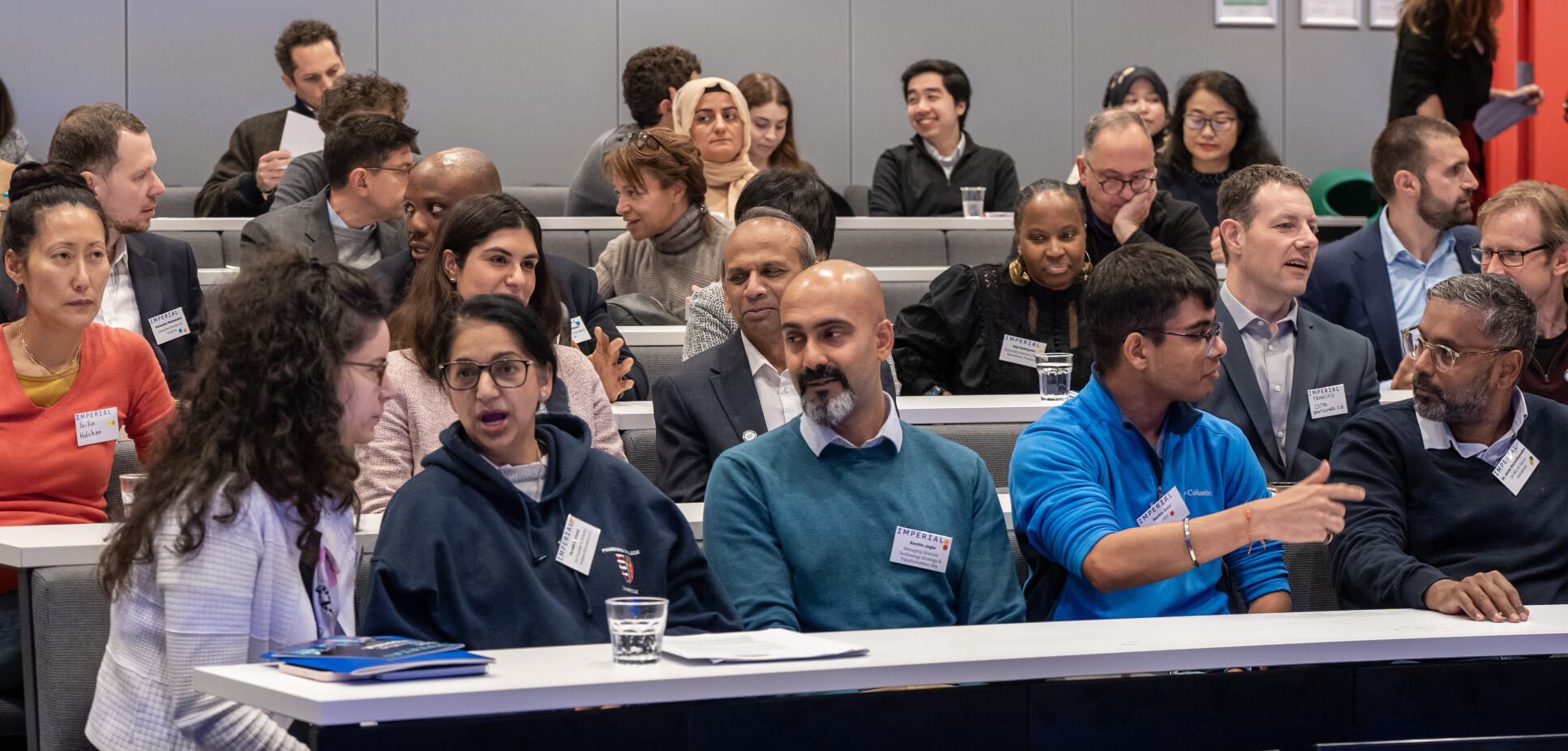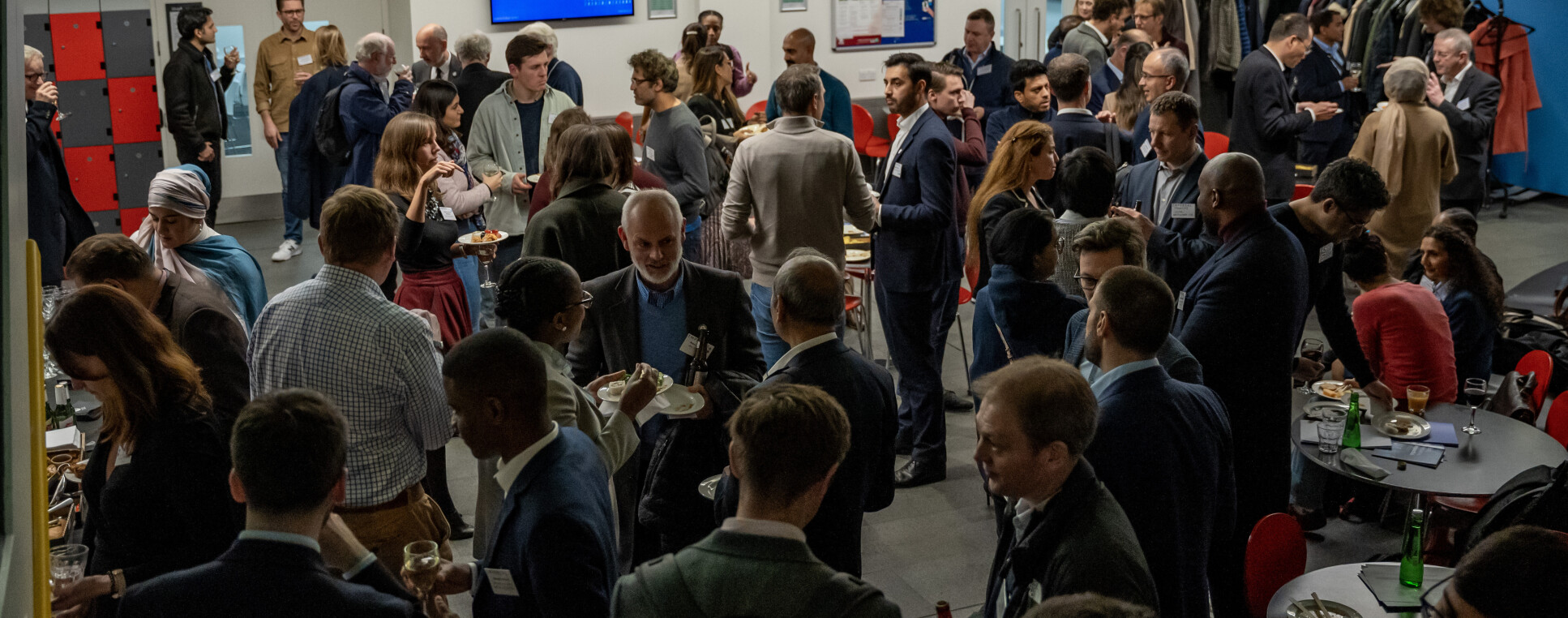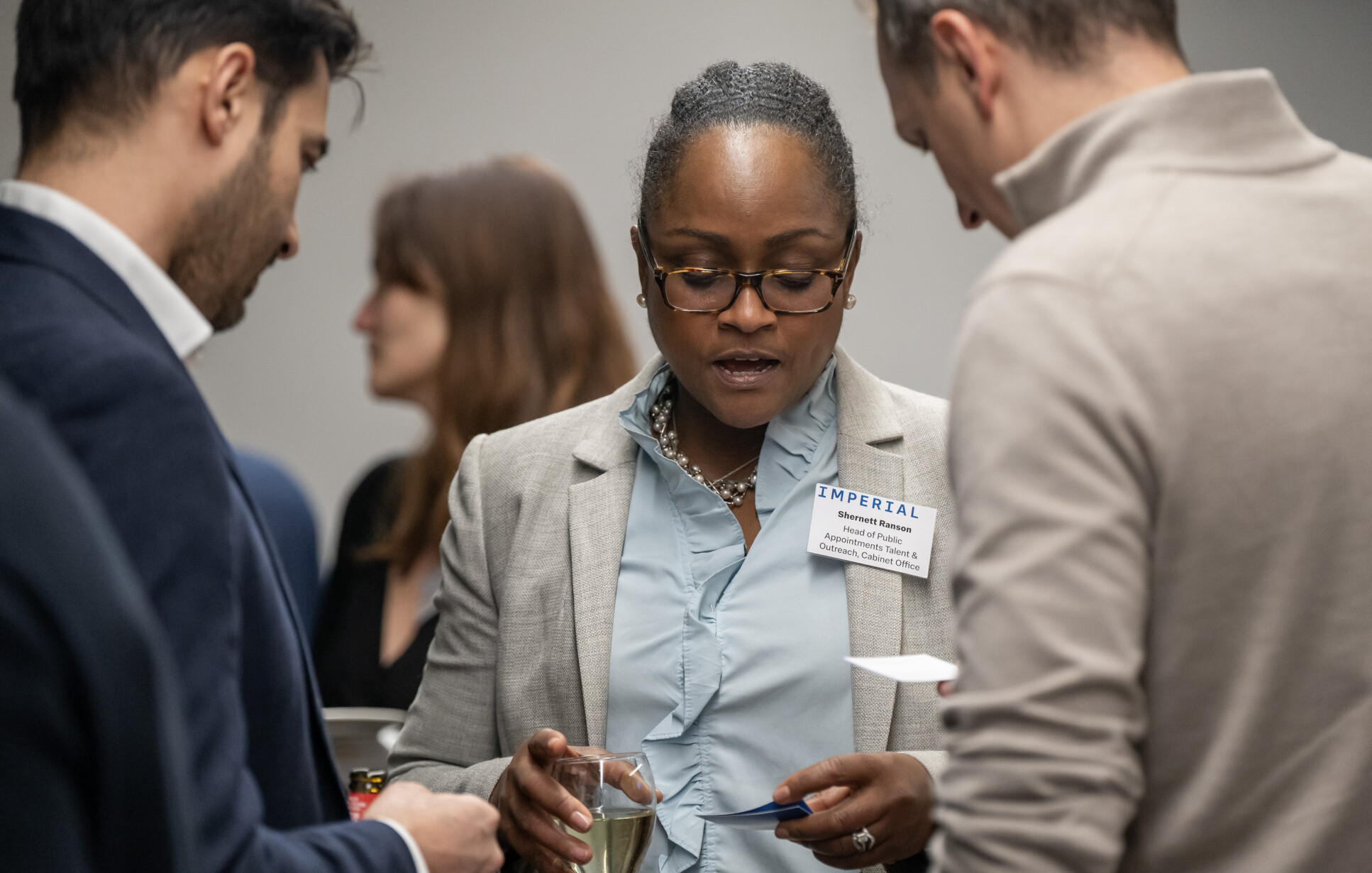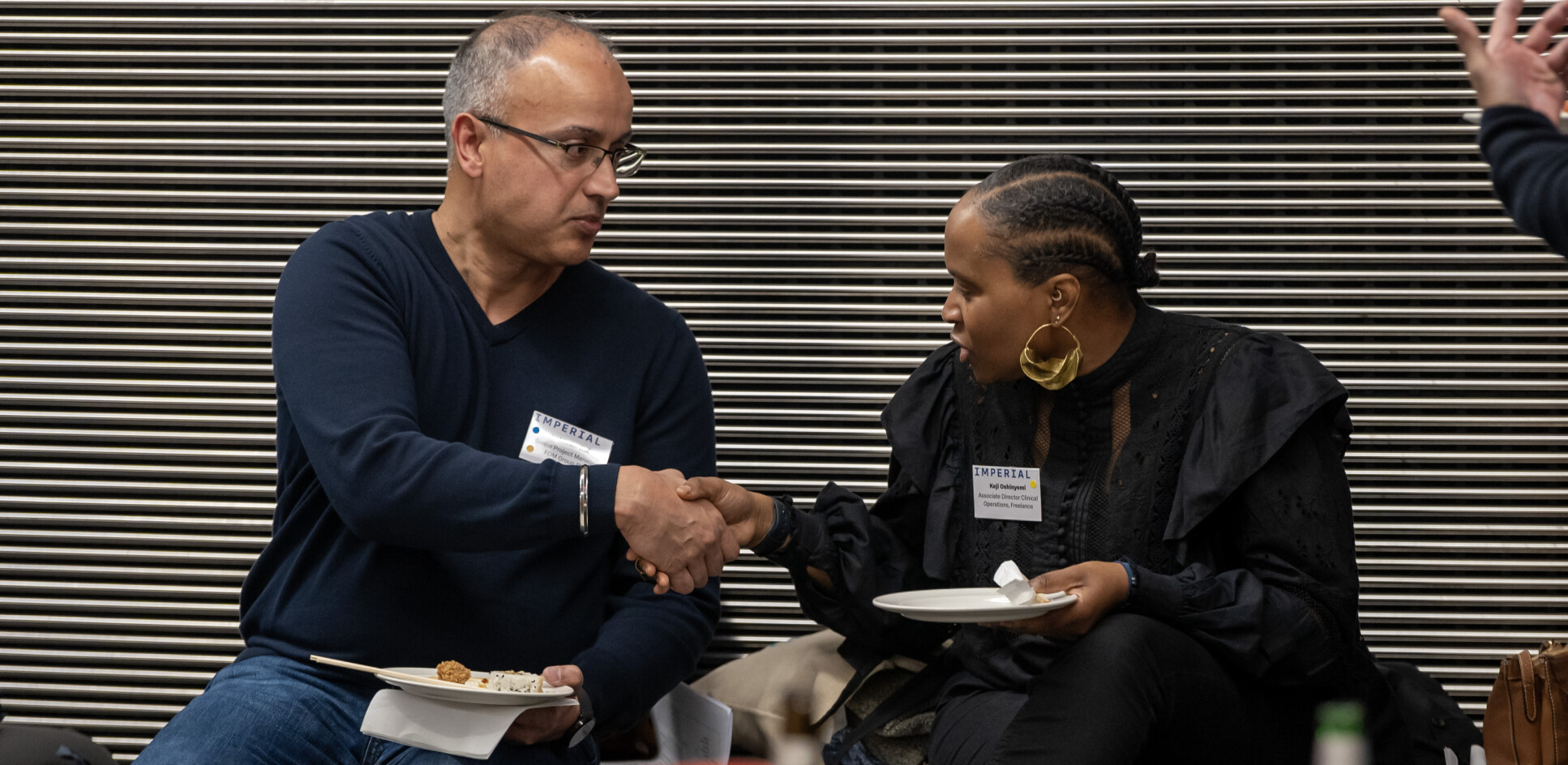Imperial alumni share their unique skill set to make a difference to society
by Jenn Rowater

Collaboration for humanity: Imperial alumni join forces with the Cabinet Office to demonstrate the impact they can have as non-executive directors.
A full house of Imperial graduates, experienced non-executive directors (NEDs) and experts from the Cabinet Office met this week to discuss how their knowledge and skills could bring a much-needed new perspective to private and public sector boards.
Part of Imperial’s lifelong career development programming for alumni, the event featured a diverse panel of Imperial graduates representing different sectors, backgrounds and experiences. Panellists shared their pathways to NED positions and an insight into what the role really entails with an audience determined to make a difference, develop their skill portfolio and take the next step in their careers.
Bringing an insight into the public sector, the panel was joined by Cabinet Office representatives Shernett Ranson (Head of Public Appointments Talent & Outreach), who chaired the panel session, and Luke Hughes (Deputy Director, Inquiries, Reviews & Public Appointments) who provided the keynote. Luke shared an overview of public sector roles, practical tips for applications, and the encouragement that the public sector needs the experience and skills of the people in the room more than ever.
Meet the experts
An alumni guide to becoming a NED
What? A critical role across all sectors
A NED is a non-executive director. A board member, there to provide independent oversight, knowledge, experience and strategic advice and, if necessary, to challenge the executive team.
Unlike an executive director, NEDs are not involved in the day-to-day running of the business – a distinction noted by Justin van Wijngaarden and Dominique Allwood.
Justin: “The most important thing about being a non-executive director, is to not be an executive director. You’re not the captain of the ship. You don’t steer it. That’s what the executive team does. The people at the coal face who are doing the day job know more than you, but you’re there to work out whether they’re helping you sail in the right direction.”
It's about understanding where the organisation is going and seeing evidence that they're doing the right things in terms of strategy and culture." Dr Dominique Allwood
Dominique: “You're not a consultant and you’re not there to run things. You need to ask questions, to use curiosity and wisdom rather than consulting and executive powers. You are there to challenge, support and assure. It's about understanding where the organisation is going and seeing evidence that they're doing the right things in terms of strategy and culture.”
Why? The value of different perspectives
NEDs bring their own experience, particular expertise and skills to an organisation, and it’s the diversity of these experiences that has the most impact – including on the bottom line.
Rimla Akhtar pointed out that Mckinsey’s ‘Diversity wins’ report shows that diversity in leadership improves the bottom line. The companies in the top quartile for gender diversity on executive teams were 25% more likely to have an above-average profitability than companies in the fourth quartile. That rises to 36% for ethnic diversity. “You don’t want group think” she explained.
Tapping into that personal experience is critical to a NED position. Hande Côté brings her extensive industry expertise from her ‘day job’ to her NED role, an invaluable perspective that helps to shape how the next generation of employees and leaders in the manufacturing space will be educated. “The manufacturing industry is trying to navigate digital trends and new technologies, from cyber security through to AI. There are many challenges around that. The University of Leeds has an incoming graduate programme in manufacturing and I have the opportunity to bring my expertise from Johnson Matthey and the technologies I worked with and knowledge of trends in the industry to set out the context of this course.”

It’s not just the board and company that benefit from NED positions – it can be just as valuable for the NED themselves, providing an insight into how to work with and influence a board, a way to develop critical leadership skills and a way to diversify your career and develop a portfolio of roles.
Dominique spoke of the altruistic reasons for becoming a NED – to bring her skills and knowledge to the health sector, but also that there is a strong non-altruistic motivation. “I was knocking around exec and sub-exec level roles and really wanted to understand how boards work better so I can influence them.”
And the benefits don’t end there. Dominique was able to negotiate time off her regular role for her NED responsibilities because of the value she was able to bring to her team. “I took a NED role in the field that I work in. We’re busy doing our jobs every day, and in the NED sessions we have a chance to be a bit more future-facing in terms of the strategy – how we plan for tomorrow, today. The way in which you facilitate that thinking was something I brought back to my role. My organisation was keen on the content I would hear but also the skills, context and strategy I would develop and implement in my team. Skills like how to listen, understanding how a board makes decisions, and writing good papers. You get to see really good examples of great chairing, great teamwork and how to ask good questions, interrogate and scrutinise. We spend time in my teams now answering the questions ‘what?’, ‘so what?’ and ‘what next?’.”

Who? “People like me”
When you picture a board, who do you imagine sitting on it? Luke highlighted one of the biggest myths in the NED world is a feeling that “it’s not for someone like me”. Not true, according to Luke. There are about 4,000 people in public appointments at any one time, and around 1,000 positions recruited every year. “I can guarantee to everyone in this room that there is a public appointment you would do brilliantly at. They need diversity of skills, experience and background.”
"I wasn’t aware that someone like me could join or be elected to a body that was so influential and impactful." Rimla Akhtar
This was a mindset Rimla identified with when she became a NED for the Football Association. “I wasn’t aware that someone like me could join or be elected to a body that was so influential and impactful. At the time, the council was made up of about a hundred people. I had just turned 30 and I was easily the youngest person ever to have been on the council at less than half the average age. I was one of four women and one of three people of colour. I was walking into it thinking it wasn’t going to be a space for me, but you have to follow your passion, take opportunities that are presented to you and step into things that might not be comfortable.”
So, difference in perspective can be a USP when it comes to NED roles.
Rimla explained, “I didn’t know anyone on the board when I was interviewed for my current NED role at Bettys and Taylors Group. They were looking for a chair of the audit and risk committee. I had a bit of experience but they had ex-CFOs and ex finance directors they were interviewing alongside little old me. They chose me because they knew they already had the right skillset there. What they were truly looking for was diversity of thought, perspective and experience, and that’s what they get with me. They’re getting the audit and risk expertise but they’re adding to that by getting difference of opinion and a challenge from someone who comes from somewhere totally different to what they’re used to around the table.”
Chatting with alumni during the networking part of the evening, Justin was very open that imposter syndrome is something he still deals with, a statement met with agreement from alumni at all levels of their career. His advice? “You have to do it anyway, take the risk, try it.”

How? Top tips for succeeding in a NED role
How do you go about finding, securing and performing well in the right NED opportunity? Here are some key takeaways from our panellists.
Find the right role:
“You have to align three things: Your passion for what the organisation does. Does their values statement and what they’re about align with your own values? Culturally, does it fit and is the culture in the organisation is something you could jump in to and even take further?” Justin
Know your strengths:
“Understand what you care about and what your strengths and your unique abilities are. For me, working from demanding offshore environments in the Gulf of Mexico to the jungles, to North America where I managed extreme operations, managing over 80 personnel with zero facilities or experience, all honed my leadership skills and crisis management skills which is what most organisations are looking for.” Hande
Pay attention to the detail:
“Read the criteria! You must demonstrate how you meet all the key criteria or you won’t be considered. Public appointments clearly list essential and desirable criteria, pay attention to it.” Luke
Make the time to do it well:
“There are the board meetings themselves, and if you’re a member of a committee that ramps up. But also, as a NED I was taught to ‘go to the street corners where the organisation hangs out’. There were a lot of visits to different parts of the organisation to get to know it better. You could be cutthroat and just attend the bare minimum of board meetings but my feeling is that if you want to do the role well, you do need to commit to some of the other activities. It’s not insignificant so be mindful when you sign up about what you’re getting into.” Dominique
Build trust:
“It’s so important to have positive relationships right across and deep into the business – outside the board – because that’s where you’ll hear information you might not hear at board level. You need people to trust you to support them if they bring issues to the surface.” Rimla
Connect with the business:
“Be connected with the business. Go to the sites, talk with people to understand their challenges. You need to stay connected from top to bottom, and also from bottom to top. It’s important to listen beyond the board and understand what the people on the ground want. Not just because it looks good on paper but for your integrity.” Hande
Take responsibility:
“You need to emphasise around the board table that you’re all in it together. It’s a collaborative effort to move the organisation forward to a better place. It’s the chair’s responsibility in the private sector to call out where the executives are failing. It’s about not sugarcoating, just giving the truth so the board can make a collective decision to make a change. You need to hone all your talents and skills and not be afraid to call it out, even if sometimes you get it wrong.” Justin
Most importantly? Luke says, “persist”. Don’t be put off, don’t expect to get the first thing you apply for. There is a need for people like Imperial alumni, with the knowledge, skills and experience they possess, to take on these roles. And as Justin concluded, ‘Amass all your experience, knowledge and know-how to become a non-executive director and make a difference to society.”

What next?
This event was the first in a new series for mid and senior career alumni who are exploring NED opportunities and portfolio careers.
- Sign up to our events emails to be the first to hear about this series as it develops.
- Let us know if you’re interested in speaking at a future event on this subject.
- Explore the full package of benefits for Imperial alumni, including online webinars, access to online library resources, a book club, alumni email address, careers support and professional development, and more.
- Activate your Imperial Plexus membership, our free online community platform for alumni where you can connect directly with other alumni, collaborate and access online benefits.

If you are interested in exploring public appointments or ready to start applying, you'll find the following links helpful:
Want to work with Imperial’s amazing alumni community?
Get in touch with the Alumni Engagement team to discuss your ideas.
Article text (excluding photos or graphics) © Imperial College London.
Photos and graphics subject to third party copyright used with permission or © Imperial College London.
Reporter
Jenn Rowater
Advancement






